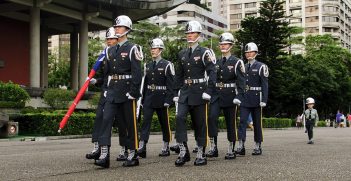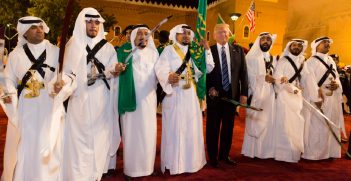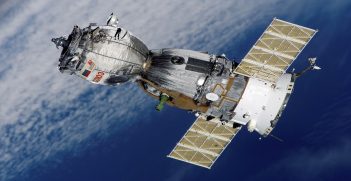The Deep Foundations of China’s Mediator Role in the Middle East

China’s activities in the Middle East over the last year, and its efforts to mediate disputes in the region, are not new. What is novel is Beijing’s willingness to publicise its behaviour in the region and potentially infringe upon the United States’ sphere of influence.
Over the last year, China’s role in the Middle East entered the international spotlight. Starting with President Joe Biden’s trip to Saudi Arabia in July 2022, media and pundit analysis about China in the region increased. Since late last year, the world has witnessed a flurry of China’s diplomatic activities in the region. Chinese President Xi Jinping visited Saudi Arabia in December to meet with Saudi leadership, the League of Arab States (Arab League), and the Gulf Cooperation Council (GCC). Iranian President Ebrahim Raisi travelled to Beijing in February. In March, during meetings hosted in Beijing, China, Saudi Arabia and Iran signed a trilateral joint statement resuming diplomatic relations between these regional rivals. Last week, China hosted foreign ministers from Iran and Saudi Arabia to further negotiate relations. China also reportedly plans to hold a Gulf Cooperation Council (GCC) – Iran summit later in the year.
The Saudi-Iran agreement, ongoing negotiations between Iran and Saudi Arabia, and the proposed GCC-Iran summit mark China’s first successful case globally of high-profile facilitation of conflict resolution between major regional rivals. These talks demonstrate China’s interest in promoting stability in the Middle East. They highlight Iran, Saudi Arabia, and the Gulf Cooperation Council countries’ belief that China can play a constructive role in resolving regional disputes. The Arab Gulf states and Iran have signalled they value China’s growing role in the region’s economics, politics, and security.
Although there has been an uptick in the highly visible nature of China’s activities in the Middle East over the last year, analysts should examine that behaviour from a historical perspective. China’s efforts to mediate disputes in the region are not new. Its diplomatic relationship building in the Middle East spans decades. What is novel is Beijing’s willingness to publicise its behaviour and potentially infringe upon the United States’ sphere of influence.
Mediating Disputes
The world may just now be noticing China as a mediator, but it has worked to contribute to peace and security in the Middle East and resolve what it perceives as hotspot issues for over 20 years. In 2002, it established a Special Envoy for Middle East issues. The primary purpose of that envoy is to contribute to the resolution of Palestinian-Israeli and Arab-Israeli conflicts by communicating with and bringing together interested parties. China views the Palestinian-Israeli conflict as a core source of tensions in the Middle East and has sought for decades to contribute to its resolution.
China also established a Special Envoy for Syria in 2016 to help resolve the Syrian civil war. The establishment of that special envoy was motivated by Beijing’s desire to prevent the spill-over of the war into a broader regional conflict, to keep the Turkistan Islamic Party (TIP) in Syria from providing material support to Uyghurs in Xinjiang, to contribute to humanitarian assistance efforts, and to offer future opportunities for Chinese businesses to participate in the reconstruction of the country after the war.
Today, one of the most destabilising factors in the Middle East is the conflict between Iran, Saudi Arabia, and the GCC states. China’s current initiatives to mediate between these countries align with its past efforts to contribute to the Middle East peace process and resolve the Syrian civil war. Beijing wants to reduce regional tensions to ensure its continued access to resources and markets. It also seeks to foster support from regional countries and demonstrate that it is a responsible power. China is not offering its own solutions to conflicts, but bringing parties together to negotiate. China is uniquely positioned to serve in this mediator role due to its growing regional interests and positive and relatively balanced relations with every country in the Middle East.
Cooperation Forums
Special Envoys are only one element of China’s long-term diplomatic interactions with the region. China conducts its most robust diplomatic engagement in the broader Middle East through three cooperation forums: the Forum on China-Africa Cooperation (FOCAC), the China-Arab States Cooperation Forum (CASCF), and the Shanghai Cooperation Organization (SCO). These organisations are China’s primary multilateral coordination mechanisms for political, economic, and security interactions with the region. It has been building these cooperation forums for over 20 years. They are the backbone of China’s engagements with the Middle East today.
At this point, all countries in the Middle East, except Israel, belong to at least one, and sometimes multiple, cooperation forums. CASCF (established in 2004) includes all members of the League of Arab States (Arab League). FOCAC (2000) encompasses the North African countries of the Middle East. Although its geographic scope was initially limited to China, Russia, Central Asian States, India, and Pakistan, the SCO (2001) now includes Middle Eastern states. Iran joined formally in 2022, and Turkey is seeking membership. Saudi, Egypt, Bahrain, Kuwait, Qatar, and Bahrain are now (or will soon become) dialogue partners with the SCO.
Strategic Partnerships
In addition to special envoys and cooperation forums, China has, over the decades, constructed a network of strategic partnerships with countries and organisations across the Middle East. Strategic partnerships are not alliances but an articulation that China seeks robust political, economic, and security relations with a regional organisation or country. China’s strategic partnerships with regional organisations that include Middle Eastern countries are the Africa Union (2012), the Arab League (2016), and GCC (2022).
China has established bilateral strategic partnerships with every major country in the region, except for Israel, including Egypt (1999), Algeria (2004), Turkey (2010), United Arab Emirates (2012), Qatar (2014), Jordan (2015), Iraq (2015), Iran (2016), Morocco (2016), Saudi Arabia (2016), Oman (2018), and Kuwait (2018). Again, China is a great power player in the region that has been around for a while and maintains constructive relations with every country.
New Publicity
What is new now is China’s willingness to showcase its activities in the region boldly. Before last year, arguably due to a concern that it did not want the United States to perceive it as infringing on its sphere of influence, China did not tend to publicise its behaviour in the Middle East. For example, the magnitude of China’s engagement in the Middle East and Africa are quite similar, though Africa has tended to be emphasised more in public relations. That dynamic has clearly changed. Today, China wants other countries to see it as a great power actor in the Middle East with the ability to bring regional countries together to pursue peace. Countries in the region, especially Saudi Arabia, Iran, and GCC members are encouraging it to play that role. Considering the deep political foundation China has built with the region over the last 20 years and its positive relations with all countries in the Middle East, China’s role as a mediator and attempts at peacemaking will likely grow. This new publicity is likely here to stay.
Dawn C. Murphy is an Associate Professor of National Security Strategy at the US National War College and author of China’s Rise in the Global South: The Middle East, Africa, and Beijing’s Alternative World Order (https://www.sup.org/books/title/?id=33516). She holds a BS in Industrial and Labor Relations from Cornell University, a Master of International Affairs from Columbia University’s School of International and Public Affairs, and a PhD in Political Science from George Washington University. Her previous academic appointments include Associate Professor of International Security Studies at the US Air War College, Visiting Assistant Professor of Political Science at George Washington University, and Postdoctoral Research Fellow with the Princeton (Columbia)-Harvard China and the World Program at Princeton University. The views expressed in this essay are those of the author and do not reflect the official policy or position of the National Defense University, the Department of Defense, or the US Government. Webpage: dawncmurphy.com; Twitter: @dawnmurphychina
This article is published under a Creative Commons License and may be republished with attribution.





